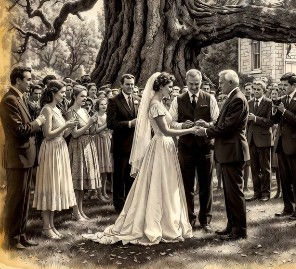Our Arklahoma Heritage: Park Cox was the voice of reason in the Crawford County ghost town of Cove City
- Dennis McCaslin

- 1 hour ago
- 3 min read



Tucked into the narrow valley where Lee Creek cuts through Crawford County, lies a forgotten crossroads once called Cove City. For half a century, one man kept its heartbeat steady:
Daniel Park Cox, a teacher, farmer, and the longest-serving Justice of the Peace the community ever knew was born February 4, 1855. Cox was only ten when the guns fell silent.
The war had raged across Arkansas like a wildfire, burning farms, splitting families, and drafting every able-bodied man it could find. Yet Park, a slight boy with a quick mind, never shouldered a rifle. His family kept him close, tending the fields and books instead of battle lines.

That early mercy 0f avoiding the carnage that claimed so many neighbors seemed to settle in him a lifelong gratitude for peace and order. By his twenties he had taken up two trades that would never leave him: teaching school and working the land.
In one-room schoolhouses scattered along the creek, he taught generations of Cove City children their letters and numbers. When the bell rang, he walked home to plow the same red-clay fields his pupils’ fathers had cleared.
The community came to see the rhythm of his life as the rhythm of the valley itself...steady, reliable, unhurried .In the early 1880s he married Eliza Virginia Shoemaker, a union that would anchor him for fifty-six years.
Together they raised a family on a modest farm just outside Cove City, where corn rows ran straight and the smokehouse stayed full

. The little settlement, technically never more than a cluster of farms, a church, and a country store, looked to the Cox place as its unofficial center
.In 1895, at age forty, Park Cox was elected Justice of the Peace. He held the office for an astonishing fifty years, retiring only when death took the gavel from his hand.
For five decades he married couples beneath the oaks at Shamrock Church, mediated fence-line squabbles before they turned to gunfire, and swore in witnesses with the same calm voice that once corrected spelling lessons.

Folks said Justice Cox could settle a dispute with a look and a single question: “Now, what would your daddy think of this?”
More often than not, that was enough.
Cove City never grew large, but it endured because men like Park Cox refused to let it fracture. During the Depression, when banks failed and roads washed out, his barn became a quiet granary for families too proud to ask outright.
He kept no record of the sacks of corn or sides of bacon that left his place, only the knowledge that the valley would feed its own .
When Eliza died in 1938, the heart went out of the old home place. At eighty-three, Park sold the farm and moved in with his daughter on Route 3 near Van Buren. Even then, old-timers still drove out to the Watson place seeking his counsel on everything from land titles to family feuds.
He dispensed advice from a rocking chair on the porch, watching the sun set over the same hills he had farmed since Reconstruction.
On March 7, 1945, after a four-week illness, Park Cox died in Fort Smith Hospital at the age of ninety. Word spread quickly along the party lines: “The Justice is gone.”

The funeral at Shamrock Church drew more people than the little building had ever held. Rev. E. L. Isabell spoke of a man who had lived the Sermon on the Mount without ever quoting it.
At the graveside in Shamrock Cemetery, Masonic Lodge No. 6 of Van Buren performed the rites for one of their oldest brothers. They laid him beside Eliza, beneath cedars that still whisper when the wind moves down the valley.
Cove City itself has nearly vanished now, swallowed by cedar thickets and new highways.
But for fifty years Park Cox : kept the peace in a place that might otherwise have torn itself apart.
He never sought glory, only fairness. And in a corner of Arkansas that time forgot, that was more than enough.



